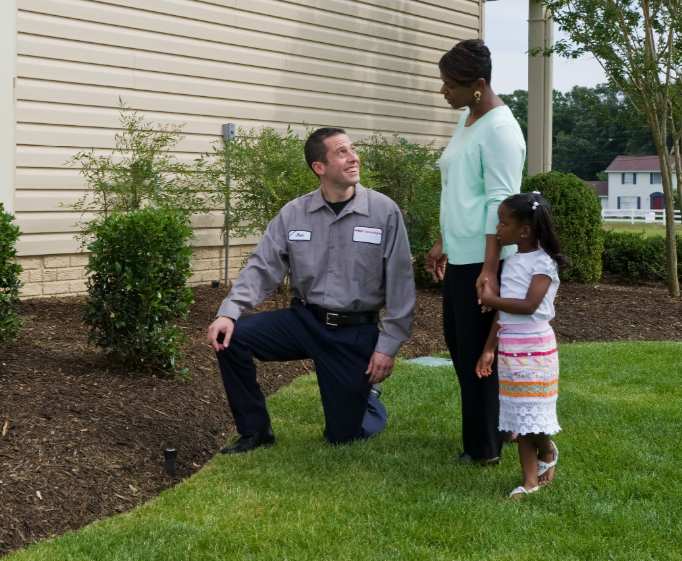Landscape Irrigation Professionals

Irrigation professionals certified by a WaterSense labeled program, can help you reduce your water consumption, save money, and maintain a healthy and beautiful landscape by maximizing the efficiency of your irrigation system. All too often, landscape irrigation wastes water. In fact, residential outdoor water use across the United States accounts for 9 billion gallons of water each day, mainly for landscape irrigation.
Properly managing your irrigation system can help you reduce your annual outdoor water use by nearly 8,800 gallons, equivalent to the amount of water used to take 500 showers!
Find a Pro
Many homeowners hire contractors to install and service their in-ground irrigation system and maintain their landscapes. Irrigation professionals with the skills and knowledge assessed by a WaterSense labeled certification program can help you improve the health and water efficiency of your outdoor space. A certified irrigation professional can:
- Design: Customize your irrigation system to best suit your landscape and account for local climate conditions.
- Install, maintain, and repair: Select and service the appropriate equipment, site layout, and ensure proper scheduling of your irrigation system to optimize performance.
- Audit: Test your irrigation system to ensure it is performs efficiently.
Check out Certified Professionals in Action to see how certified professionals apply specific techniques and technologies to boost water efficiency.
Additional Information
Are you an irrigation professional who wants to earn a WaterSense labeled certification? Visit the Professional Certification page for more information.
Ask the Right Questions
When hiring an irrigation professional, landscaper or gardener to design, install or maintain your irrigation system or landscape, make sure the contractor understands the building blocks of water-efficient outdoor systems. Start by confirming that the contractor is licensed and bonded; then ask for training and professional certifications.
Here are a few questions you can ask to assess your contractor's skills and experience:
-
What professional certifications or training have you received that address water efficiency or sustainable landscaping? For instance, have you completed a WaterSense labeled certification program?
Why Ask This Question?
If your contactor has a license or professional certification, or has completed training in sustainable landscape design or care, it's likely he or she will be better prepared to assess areas of water waste in your landscape. -
What are your recommendations for minimizing water waste in my yard?
Listen for suggestions like:- Using regionally appropriate, drought-tolerant, or native plants that thrive in your climate
- Adding mulch to plant beds
- Checking sprinkler heads for breaks or leaks and ensuring water is going where it's needed
- Testing your irrigation system to ensure the zones are programmed correctly
- Checking your irrigation system to look for water efficiency improvements
- Providing you with an irrigation schedule that makes seasonal adjustments easy
- Retrofitting your irrigation system with new, water-efficient technologies, such as a WaterSense labeled controller, rainfall sensor, or high-efficiency sprinkler nozzles
Why Ask This Question?
Contractors who provide these suggestions demonstrate that they know how to improve the health and water efficiency of your irrigation system or landscape design by using established techniques and new and smarter technologies. -
How will you make sure that my irrigation system is watering the right amount for my landscape? Can you provide examples of other sites where you've reduced water waste through better management, plant selection, or irrigation system upgrades?
Why Ask This Question?
If your contactor can speak competently about how to improve your irrigation system to meet plants' needs without overwatering and can provide examples from other sites, they are more likely to be capable of moving your landscape towards water efficiency.
Get Results
Learn how to maximize the water efficiency of your irrigation system. Educate yourself by asking your contractor these questions:
- How do I adjust my irrigation controller to apply the least amount of water necessary to promote deeper root growth and build drought tolerance in my yard?
- Is a "smart" irrigation controller, such as a WaterSense labeled model, right for my landscape? How will it help me save water and money over the long term?
- Do some irrigated areas (e.g., zones) in my yard require more water than others? Can I cut off irrigation to some of my established plants and just water by hand when necessary? Can you show me how to set my controller so I water only the zones that need it and not the zones that don't?
- I've heard that my yard's water needs vary throughout the year. Can you show me how to adjust my irrigation system with the seasons? Can you provide a written irrigation schedule that also accounts for seasonal changes?
- Should I still water my yard in the cooler months? Or should I winterize my irrigation system? If so, when and how?
- Can you recommend a few native plants that will both thrive in my climate and provide beautiful accents to my yard?
- What else can I do in my yard to use less water? Can you recommend any smart practices, alternative plants or groundcover, or maintenance options that will help me be more water-efficient?
Click here for a PDF version (1 pg, 66K, About PDF) of these questions.




